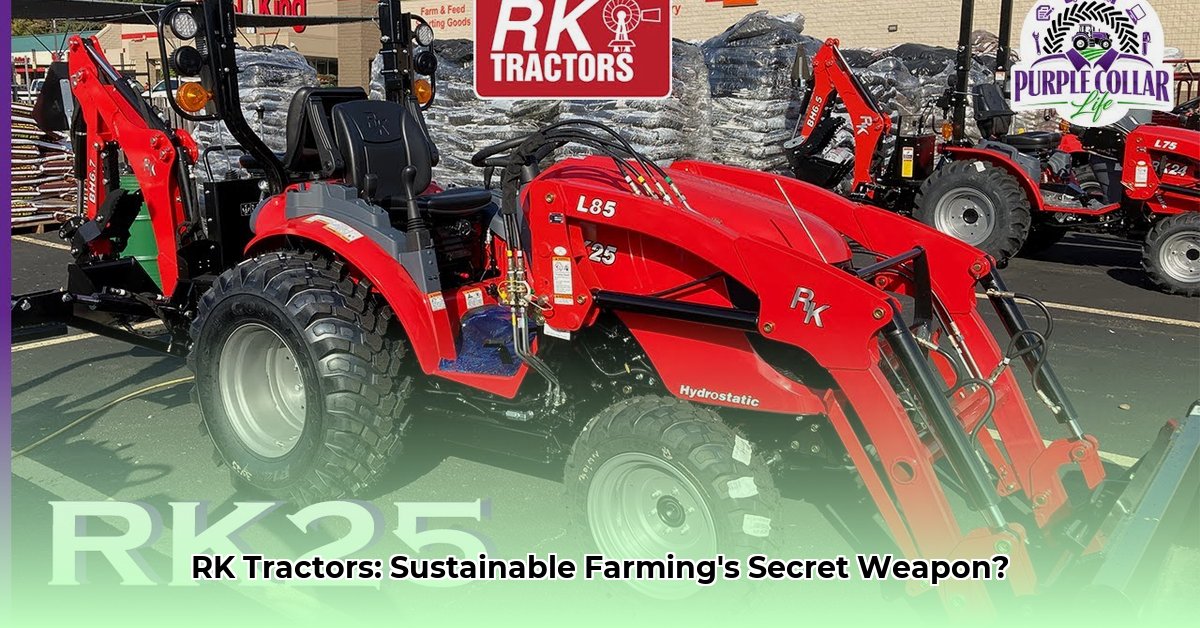
Thinking about buying a Rural King (RK) tractor? Their lower price point is undeniably attractive, particularly for budget-conscious farmers. However, affordability often comes with compromises, and reliability is a major concern for many RK tractor owners. This review provides an honest assessment, examining both the advantages and disadvantages to help you make an informed decision. For more in-depth information, check out this detailed analysis.
The Allure of Affordability: A Tempting Price Tag
RK tractors significantly undercut the prices of established brands like John Deere or Kubota. This lower initial investment can be crucial for smaller farms or those just starting out, freeing up capital for other essential farming needs. However, this significant price difference raises questions about potential trade-offs in terms of build quality and long-term maintenance.
Reliability Concerns: Balancing Savings with Potential Downtime
Numerous RK tractor owners report reliability issues. Common complaints focus on transmission problems, electrical system failures (often attributed to corrosion), and concerns about overall build quality. These problems translate directly to lost productivity and income. A broken-down tractor during a critical planting or harvesting window can be devastating. One farmer reported a month-long repair delay for a relatively minor issue—a significant loss of valuable time.
“The electrical system on my RK tractor failed twice in the first year,” commented Sarah Miller, a third-generation farmer in Iowa. “The repairs were expensive and time-consuming, significantly impacting my planting schedule.”
Service and Support: Geographic Limitations and Response Times
The availability of timely and effective service is a critical factor. While RK has introduced mobile service units, their reach is limited compared to the extensive dealer networks of major brands. For farmers located far from an RK store or authorized repair facility, this poses a significant challenge. A comprehensive repair might require transporting the tractor to a service center, leading to prolonged downtime. The speed and quality of service vary considerably depending on location.
The Total Cost of Ownership: Initial Savings vs. Unexpected Expenses
The enticing low purchase price of an RK tractor is often offset by potential repair costs and downtime. A seemingly small initial saving can quickly disappear when faced with expensive repairs and lost productivity. The total cost of ownership over the tractor's lifespan is the far more relevant metric. Careful consideration of this factor is paramount.
Sustainable Farming: The Reliability Equation
For sustainable farms, reliable equipment is paramount. Frequent repairs, parts replacements, and premature tractor discard negatively impact both environmental sustainability and economic viability. A tractor that spends more time in the shop than in the field directly conflicts with the goals of sustainable farming.
Actionable Steps Before Purchasing an RK Tractor
Before purchasing any RK tractor, several steps are crucial:
Professional Pre-Purchase Inspection: A qualified mechanic should thoroughly inspect the tractor to identify potential problems before purchase. This is a worthwhile investment to avoid costly surprises later.
Warranty Analysis: Carefully scrutinize the warranty details, understanding what’s covered and the repair process. Expect to ask many questions.
Service Network Assessment: Investigate the proximity and capabilities of the nearest repair facility. Consider transportation costs and downtime in case of a breakdown.
Spare Parts Strategy: Research the availability of spare parts. Consider purchasing frequently-needed parts in advance to minimize downtime.
Extended Warranty: Explore purchasing an extended warranty to mitigate some risks associated with repairs. Budget for this potential cost upfront.
Risk Assessment Matrix: Understanding Potential Pitfalls
The following table summarizes the potential risks associated with RK tractor ownership:
| Risk Factor | Likelihood | Impact | Mitigation Strategy |
|---|---|---|---|
| Transmission Problems | Moderate | High | Extended warranty; preventative maintenance; thorough pre-purchase inspection. |
| Electrical Malfunctions | Moderate | Moderate | Regular inspections; preventative maintenance; professional repairs. |
| Parts Availability | Low | Moderate | Develop relationships with local mechanics; consider purchasing essential spare parts in advance. |
| Service Network Access | Low | High | Research geographically close service centers; consider independent service options. |
| Brand Reputation | Moderate | Moderate | Thoroughly examine online reviews and farmer experiences from multiple sources. |
The Verdict: Informed Decision-Making
RK tractors can present a cost-effective entry point to tractor ownership, but potential reliability issues and service limitations need careful consideration. The price tag alone shouldn't drive the decision. Weigh the affordability against potential repair costs, downtime, and the overall impact on your farm's long-term sustainability. Thorough research and a realistic assessment are vital.